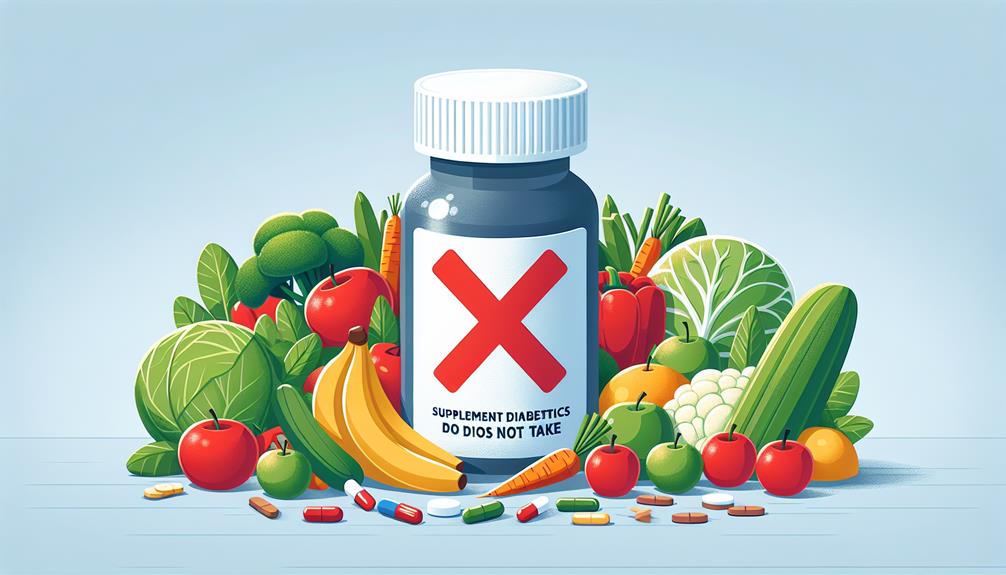
There are certain supplements diabetics should not take and which you should avoid in order to manage your diabetes effectively. Stay away from Chromium in high doses; consult healthcare providers first. Be cautious with Bitter Melon, Echinacea, and Ginseng for potential blood sugar impacts, especially if on diabetes medications. Magnesium supplementation needs healthcare provider approval due to its effects. Consider risks of Alpha-Lipoic Acid, St. John's Wort, and Garcinia Cambogia on blood sugar levels. Always consult healthcare providers before trying any new supplement for a safer diabetes management plan.
Key Takeaways
- Avoid high doses of chromium supplements due to potential adverse effects.
- Exercise caution with bitter melon supplements as they can lower blood sugar levels.
- Ginseng may cause blood sugar fluctuations and increase the risk of hypoglycemia.
- St. Johns Wort can interact with diabetes medications and affect blood sugar levels.
- Garcinia Cambogia poses risks for diabetics due to its impact on blood sugar levels.
Chromium
To avoid potential risks, individuals with diabetes should exercise caution when considering chromium supplements. Chromium is a mineral that plays a role in regulating blood sugar levels by enhancing the action of insulin. Some studies suggest that chromium supplementation may improve glucose metabolism in individuals with diabetes. However, the evidence isn't conclusive, and more research is needed to determine the effectiveness and safety of chromium supplements in managing diabetes.
While chromium is an essential nutrient in small amounts, taking high doses in supplement form can lead to adverse effects. Excessive intake of chromium supplements may cause stomach problems, low blood sugar levels (hypoglycemia), and impair liver and kidney function. Therefore, it's crucial for individuals with diabetes to consult healthcare providers before starting chromium supplements to avoid potential complications.
Bitter Melon
Individuals with diabetes should exercise caution when considering bitter melon supplements due to potential interactions with blood sugar levels. Bitter melon, also known as bitter gourd or Momordica charantia, is a fruit commonly used in traditional medicine for its purported antidiabetic properties. However, research on the efficacy and safety of bitter melon in diabetes management is limited and conflicting.
Studies suggest that bitter melon may lower blood sugar levels by increasing insulin secretion or improving insulin sensitivity. While this could be beneficial for individuals with diabetes, it can also lead to hypoglycemia (low blood sugar levels) when taken in conjunction with diabetes medications that lower blood sugar. Therefore, it's crucial for individuals with diabetes who are considering bitter melon supplements to consult with a healthcare provider before incorporating them into their treatment regimen.
Echinacea
When considering supplements diabetics should not take, caution should be exercised with Echinacea due to its potential effects on blood sugar levels.

Echinacea, commonly used to boost the immune system, may interact with diabetes medications and impact blood glucose control. Research suggests that Echinacea could potentially lower blood sugar levels, leading to hypoglycemia when taken alongside diabetes medications that also lower blood sugar.
This herb may also interfere with blood sugar monitoring, affecting the accuracy of glucose readings. For individuals with diabetes, maintaining stable blood sugar levels is crucial for overall health and to prevent complications.
Therefore, it's essential to consult healthcare providers before incorporating Echinacea into your supplement regimen. Monitoring blood sugar levels regularly and seeking medical advice can help prevent adverse interactions and ensure safe use of supplements.
Ginseng
Caution must be taken when considering the use of ginseng as a diabetic supplement due to its potential impact on blood sugar control. Ginseng is a popular herbal remedy that has been used for centuries in traditional medicine. However, for individuals with diabetes, ginseng may not be the best choice. Here's why:
- Blood Sugar Interactions: Ginseng has been shown to affect blood sugar levels, potentially causing them to either rise or fall. This can be dangerous for diabetics who need to carefully control their blood glucose levels.
- Medication Interference: Ginseng may interact with diabetes medications, affecting their effectiveness. This interference can lead to unanticipated changes in blood sugar levels, complicating diabetes management.
- Hypoglycemia Risk: Due to its blood sugar-lowering effects, ginseng may increase the risk of hypoglycemia in diabetics. This condition, characterized by low blood sugar levels, can be harmful and even life-threatening if not promptly addressed.
Considering these factors, individuals with diabetes should exercise caution and consult healthcare providers before incorporating ginseng into their supplement regimen.
Magnesium
Ginseng's potential impact on blood sugar control prompts consideration of another diabetic supplement – magnesium. Magnesium is an essential mineral that plays a crucial role in various bodily functions, including blood sugar regulation. Research suggests that magnesium deficiency may be more common in individuals with diabetes and could contribute to insulin resistance. While magnesium supplementation has shown some benefits in improving insulin sensitivity and glucose control in individuals with diabetes, the evidence isn't strong enough to recommend it as a routine supplement for all diabetics.

It is important for individuals with diabetes to consult their healthcare provider before starting magnesium supplementation, as it can interact with certain medications and may not be suitable for everyone. Additionally, high doses of magnesium from supplements can cause side effects such as diarrhea, nausea, and abdominal cramping. Therefore, if you're considering magnesium supplementation for diabetes management, it's crucial to discuss the potential risks and benefits with your healthcare team to make an informed decision.
Alpha-Lipoic Acid
Alpha-Lipoic Acid, an antioxidant naturally produced by the body, has gained attention for its potential benefits in improving nerve function and reducing inflammation in individuals with diabetes. While it may seem like a promising supplement, there are specific reasons why diabetics should exercise caution when considering its use:
- Interaction with Medications: Alpha-Lipoic Acid can interact with medications such as chemotherapy drugs, thyroid medications, and antidiabetic drugs, potentially altering their effectiveness.
- Hypoglycemia Risk: In some cases, taking Alpha-Lipoic Acid may lead to lower blood sugar levels, increasing the risk of hypoglycemia, especially when combined with other glucose-lowering medications.
- Limited Scientific Evidence: Despite some positive findings, the scientific evidence supporting the use of Alpha-Lipoic Acid in diabetes management isn't yet conclusive, leading to uncertainties regarding its long-term safety and efficacy.
Considering these factors, it's important for individuals with diabetes to consult healthcare providers before incorporating Alpha-Lipoic Acid into their supplement regimen to avoid potential adverse effects on their health.
Coenzyme Q10
Coenzyme Q10, also known as CoQ10, plays a significant role in cellular energy production and antioxidant defense mechanisms. While it is a popular supplement with potential benefits for some individuals, there are considerations for diabetics regarding its use. For people with diabetes, CoQ10 supplementation may have varying effects on blood sugar levels. Some studies suggest that CoQ10 could potentially lower blood sugar, which may require adjustments in diabetes medication to prevent hypoglycemia. On the other hand, CoQ10 is also known to interact with certain medications used to manage diabetes, such as blood thinners like warfarin, potentially affecting their effectiveness.
To provide a clearer understanding, here is a table summarizing the potential interactions and considerations for diabetics when taking Coenzyme Q10:
| Consideration | Description | Impact on Diabetes |
|---|---|---|
| Blood Sugar Levels | May lower blood sugar levels | Monitor closely |
| Medication Interactions | Interacts with medications like warfarin | Adjust medication |
| Antioxidant Defense Mechanisms | Supports antioxidant function in the body | Potential benefits |
It is crucial for individuals with diabetes to consult with healthcare providers before starting any new supplements and to recognize the supplements diabetics should not take, including Coenzyme Q10, to ensure safety and effectiveness in their management plan.

St. Johns Wort
St. John's Wort, a herbal supplement commonly used for mood support, poses certain considerations for individuals with diabetes due to its potential interactions with medications and effects on blood sugar levels. Here are three important points to consider:
- Medication Interactions: St. John's Wort can interact with various medications commonly used by individuals with diabetes, such as insulin and oral hypoglycemic agents. These interactions can lead to either decreased effectiveness of the medications, resulting in high blood sugar levels, or increased effects, leading to low blood sugar levels.
- Blood Sugar Levels: Studies suggest that St. John's Wort may affect blood sugar levels, potentially causing fluctuations that can be problematic for individuals with diabetes who need to carefully control their blood glucose levels.
- Consult Healthcare Provider: If you have diabetes and are considering taking St. John's Wort, it's crucial to consult your healthcare provider or a pharmacist to understand the potential risks and benefits, especially in relation to your current medications and blood sugar management.
Garcinia Cambogia
Considering potential concerns with herbal supplements for individuals with diabetes, the discussion now shifts to Garcinia Cambogia, a supplement that has garnered attention for its purported weight loss benefits.
Garcinia Cambogia contains hydroxycitric acid (HCA), which is claimed to aid weight loss by inhibiting an enzyme involved in fat storage and suppressing appetite. However, for individuals with diabetes, Garcinia Cambogia poses risks due to its potential effects on blood sugar levels.
Research suggests that HCA may lower blood sugar levels, potentially leading to hypoglycemia in diabetic individuals who are already managing their blood sugar levels with medications like insulin or oral hypoglycemic agents. Additionally, Garcinia Cambogia has been associated with adverse effects such as liver toxicity and gastrointestinal issues.
Given these concerns, individuals with diabetes should exercise caution and consult healthcare providers before considering Garcinia Cambogia as a weight loss supplement. It's crucial to prioritize evidence-based approaches to weight management that are safe and effective for individuals with diabetes.
Conclusion
In conclusion, it's important for diabetics to be cautious when considering taking supplements and understand which supplements diabetics should not take. Studies have shown that up to 20% of diabetics experience negative side effects from certain supplements, such as chromium and ginseng.

It's always best to consult with a healthcare provider before adding any new supplement to your regimen to ensure it's safe and beneficial for your individual health needs. Your health is too important to take risks with unproven supplements.




